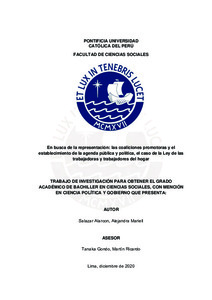| dc.contributor.advisor | Tanaka Gondo, Ricardo Martín | |
| dc.contributor.author | Salazar Alarcon, Alejandra Mariell | |
| dc.date.accessioned | 2022-09-02T21:53:36Z | |
| dc.date.available | 2022-09-02T21:53:36Z | |
| dc.date.created | 2020 | |
| dc.date.issued | 2022-09-02 | |
| dc.identifier.uri | http://hdl.handle.net/20.500.12404/23243 | |
| dc.description.abstract | La historia republicana del Perú se define por la debilidad de sus gobiernos
democráticos y los periodos largos de dictaduras que han obstaculizado la
canalización de las demandas de la sociedad por parte de las autoridades, situación
que se complica aún más con el debilitamiento de los partidos políticos tradicionales
durante la dictadura de Fujimori en la década de los 90s. En este contexto, y con el
retorno a la democracia en el siglo XXI, se ha hecho evidente que nuestro proceso
legislativo se define en torno a la debilidad institucional del Congreso, a la escasez
de los partidos políticos tradicionales, y la abundancia de legisladores y/o partidos
sin claras líneas programáticas. De esta manera, con el propósito de profundizar en
el estudio del proceso legislativo peruano, este trabajo plantea explicar los factores
que facilitan la representación y canalización de las demandas de sectores
vulnerables de la sociedad en el Congreso. Para ello, se toma como caso de estudio
la aprobación de la Ley de trabajadoras y trabajadores del hogar en setiembre del
2020, para determinar el grado de importancia de factores como el establecimiento
de la agenda pública y política, las coaliciones promotoras, y el grado de autonomía
en el actuar de los legisladores, y se propone el uso de un método cualitativo a través
de entrevistas para estudiarlo. Así, la hipótesis principal que planteo es que es la
incidencia de distintos actores mediante coaliciones promotoras, y de factores
externos al funcionamiento del Congreso los que facilitan la canalización de las
demandas de sectores vulnerables de la sociedad. | es_ES |
| dc.description.abstract | The republican history of Peru has been defined by the weakness of its democratic
governments and the long periods of dictatorships that have generally hindered the
channelling of the demands of the society by the authorities, a situation that was
further complicated by the weakening of traditional political parties during the Fujimori
dictatorship in the 1990s. In this context, and with the return to democracy in the 21st
century, it has become evident that the legislative process is mainly defined around
the institutional weakness of Congress, the scarcity of traditional political parties, and
the abundance of legislators and/or parties without clear programmatic lines. This
way, with the purpose of deepening the study of the Peruvian legislative process, this
work plans to explain the factors that facilitate the representation and channelling of
the demands of vulnerable sectors of society in Congress. Therefore, we take as a
case study the approval of the Domestic Workers Law in September of 2020 to
determine the level of importance of factors such as the establishment of the public
and political agenda, the advocacy coalitions, and the legislators’ actions degree of
autonomy, and we propose the use of a qualitative method of study through
interviews. Thus, the main hypothesis that is proposed here is that the incidence of
different actors, through advocacy coalitions, and of factors external to the operation
of Congress facilitate channelling the demands of vulnerable sectors of society. | es_ES |
| dc.language.iso | spa | es_ES |
| dc.publisher | Pontificia Universidad Católica del Perú | es_ES |
| dc.rights | info:eu-repo/semantics/openAccess | es_ES |
| dc.rights.uri | http://creativecommons.org/licenses/by-nc-sa/2.5/pe/ | * |
| dc.subject | Servicio doméstico--Perú | es_ES |
| dc.subject | Leyes--Perú | es_ES |
| dc.subject | Gobierno representativo--Perú | es_ES |
| dc.title | En busca de la representación: las coaliciones promotoras y el establecimiento de la agenda pública y política, el caso de la Ley de las trabajadoras y trabajadores del hogar | es_ES |
| dc.type | info:eu-repo/semantics/bachelorThesis | es_ES |
| thesis.degree.name | Bachiller en Ciencias Sociales con mención en Ciencia Política y Gobierno | es_ES |
| thesis.degree.level | Bachillerato | es_ES |
| thesis.degree.grantor | Pontificia Universidad Católica del Perú. Facultad de Ciencias Sociales | es_ES |
| thesis.degree.discipline | Ciencias Sociales con mención en Ciencia Política y Gobierno | es_ES |
| renati.advisor.dni | 06408442 | |
| renati.advisor.orcid | https://orcid.org/0000-0001-6640-1518 | es_ES |
| renati.author.dni | 72726236 | |
| renati.discipline | 312026 | es_ES |
| renati.level | https://purl.org/pe-repo/renati/level#bachiller | es_ES |
| renati.type | https://purl.org/pe-repo/renati/type#trabajoDeInvestigacion | es_ES |
| dc.publisher.country | PE | es_ES |
| dc.subject.ocde | https://purl.org/pe-repo/ocde/ford#5.06.00 | es_ES |






